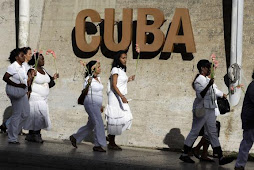February 21, 2012
Irina Echarry
HAVANA TIMES, Feb 21 — When she visited the Venezuelan consulate for the
second time, it wasn't at the same address as when she first went there,
which was an indication of how much time had lapsed between the two visits.
Permission to Leave Cuba (I):
http://www.havanatimes.org/?p=62176
On the first trip she didn't like the place, which was set up to respond
to questions anyone might have. Nor did she like how she was attended to
by the consular staff. The waiting area was a very small fenced-in yard
on the side of the building, one that reminded her of the high level of
security at the Havana zoo.
The ceiling was like the one in the Immigration office, the kind that
intensifies the sun's heat. In the waiting room were a few chairs with
three or four people sitting around, slumped over with bowed heads.
A couple of Cuban employees were seated behind laptops asking each
person for their ID card, though all she wanted was to know what she had
to do to apply for a visa. They later gave her two sheets of paper: one
was a checklist of all the papers she would need to turn in, the other
was the application form.
Although she wasn't turning in any of the paperwork at that moment, her
name was recorded on one of the laptops.
She left reading the extensive list of requirements but focusing on one
requirement: the number of her bank account, when it was opened and the
balance.
Damn! Never in her life had she had any money to think about opening an
account. But if they were asking that, it must have been a sign that if
you didn't have a bank account then you couldn't get a visa.
She understood practically nothing (she's still a little slow when it
comes to matters related to filling out forms). What she did understand
was that she was required to get a detailed medical exam, including an
x-ray; a notarized statement that she wasn't the owner of the house
where she lived, in addition to supplying a copy of her criminal
background check and her employment record, which had to show — among
other things — her pay and the time she was being allowed off for
travel. She would, of course, also have to show her letter of invitation.
Her girlfriend had already taken care of the letter, though it took a
couple months for processing and more than 2,000 Bolivars (about $465 USD).
Still, she was worried about everything that had to do with the bank.
Her girlfriend did a search on the internet (online access is easy in
Venezuela) and — to her horror! — the consulate webpage explained that
at least 1,000 CUCs had to be in a Cuban bank account, which itself
needed to be set up at least six months prior to the application.
In this space on the form, it's more likely that we Cubans will fill it
in with 1,000 bad words expressing our tears and despair, since a 1,000
CUCs equal 25,000 national pesos (over $1,100 USD). Enough said.
For six months, with her girlfriend over there and she here on the
island, they managed to come up with the money. At least good fortune
smiled on them in this regard.
When she returned to the consulate, it was no longer at the same
address, nor did it have a small barred cell for people. It's now a
small air-conditioned office with a nice person behind the laptop.
What she discovered this time was they no longer require 1,000 CUCs in a
bank account. One hundred CUCs is now enough.
She could breathe again. It was a great relief, though she retained a
trace of confusion and distrust. She had gone there to ask about a
couple of details she didn't understand concerning everything that had
to be turned in, and she came out with that wonderful piece of news.
She had already gotten everything concerning her medical exam, the
requirements from the notary, now she was only waiting for a couple of
documents to be legalized by the Cuban Ministry of Foreign Affairs
(MINREX), which would take about a month (in other words, she would have
to wait that time for just a couple of rubberstamped seals).
Meanwhile, this meant that the "extra" money in the bank account could
be used for her airfare.
Once her papers were legalized by the Foreign Ministry — she had
previously bought more stamps for them, paying in CUCs — she would be
ready to present her file and apply for her visa interview.
In the meantime, lots of other documents needed to be photocopied and a
payment made to the bank in CUCs for them to issue a certificate
concerning her bank account.
She would also be praying that the consular official didn't find it
suspicious that a Cuban wanted to spend her vacation in Venezuela. In
neither of the two countries is marriage legal between two people of the
same sex, so that "truer" truth couldn't be told when the time came.
But there was still more than enough time to think about how that
dreaded interview would be.
To be continued…





No comments:
Post a Comment